Introduction
Custom AI solutions for businesses have emerged as a game-changing force in the corporate world, revolutionizing operations across various sectors.
As companies seek to gain a competitive edge, the adoption of custom AI models for businesses has skyrocketed, offering tailored solutions to unique challenges.
Recent statistics underscore the growing importance of custom AI for business. According to a 2023 report by Gartner, 75% of enterprises will shift from piloting to operationalizing AI by 2024, driving a 5X increase in streaming data and analytics infrastructures.
This surge in AI adoption highlights the critical role of custom AI solutions for businesses in driving innovation and efficiency.
The market for AI software is projected to reach $126 billion by 2025, as reported by Tractica, with a significant portion dedicated to custom AI integrations for businesses.
These best AI integrations for businesses are not one-size-fits-all solutions, but rather tailored approaches designed to address specific business needs.
As we delve into this beginner's guide to custom AI for business, we'll explore how these custom AI for business is reshaping the corporate landscape, offering unprecedented opportunities for growth, efficiency, and innovation.
What is Custom AI for Business and its Features?
Custom AI for Business refers to the development and implementation of tailored artificial intelligence solutions designed to address specific challenges and needs within an organization.
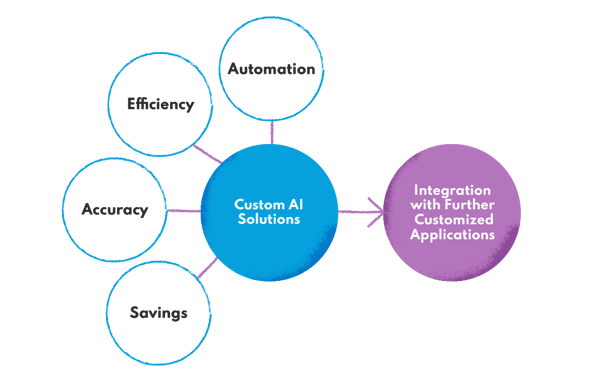
Unlike off-the-shelf AI products, custom AI is built to integrate seamlessly with a company's existing systems, processes, and data infrastructure.
Key features of Custom AI for Business include:
Custom AI for business offers tailored solutions that optimize operations, enhance security, and provide industry-specific expertise for growth.
Personalized problem-solving: Custom AI for business is developed to tackle unique business challenges, from optimizing supply chains to enhancing customer experiences.
Data integration: Custom AI for business can be designed to work with proprietary data formats and sources, ensuring compatibility with existing databases and information systems.
Scalability: Custom AI for business can be built to grow with the business, accommodating increasing data volumes and evolving needs over time.
Industry-specific expertise: Custom AI solutions can incorporate domain knowledge relevant to specific industries, improving accuracy and relevance of insights.
Competitive advantage: By developing unique AI capabilities, businesses can differentiate themselves from competitors relying on generic AI tools.
Enhanced security: Custom AI for business can be built with specific security protocols to protect sensitive business data and comply with industry regulations.
Continuous Improvement: These systems can be designed for ongoing learning and refinement based on new data and feedback loops.
Integration with existing workflow: Custom AI for business can be seamlessly incorporated into current business processes, minimizing disruption and maximizing adoption.
Tailored user interfaces: The AI's front-end can be designed to match company branding and user preferences, improving usability.
Flexible deployment options: Custom AI for business can be implemented on-premises, in the cloud, or in hybrid environments, depending on the company's infrastructure and requirements.
By leveraging custom AI for business, businesses can harness the power of artificial intelligence in ways that are uniquely suited to their goals, culture, and operational needs.
Benefits of Custom AI for Business
Implementing Custom AI for Business can revolutionize how companies operate.
Businesses that leverage custom AI for business can streamline processes, reduce costs, and enhance customer satisfaction.
Increased Efficiency
Custom AI solutions for businesses automate routine tasks, allowing employees to focus on higher-value activities.
Imagine a retail company that uses AI to manage inventory. Custom AI for business predicts demand based on historical data and current trends, ensuring optimal stock levels.
This automation reduces manual errors and ensures that products are always available, significantly improving operational efficiency.
Cost Savings
Adopting custom AI models for businesses can lead to substantial cost savings. Consider a manufacturing firm that integrates AI to monitor equipment health.
Predictive maintenance, powered by AI, identifies potential issues before they become serious problems, preventing costly breakdowns.
This approach not only reduces maintenance costs but also extends the lifespan of equipment, saving the company money in the long run.
Enhanced Customer Experience
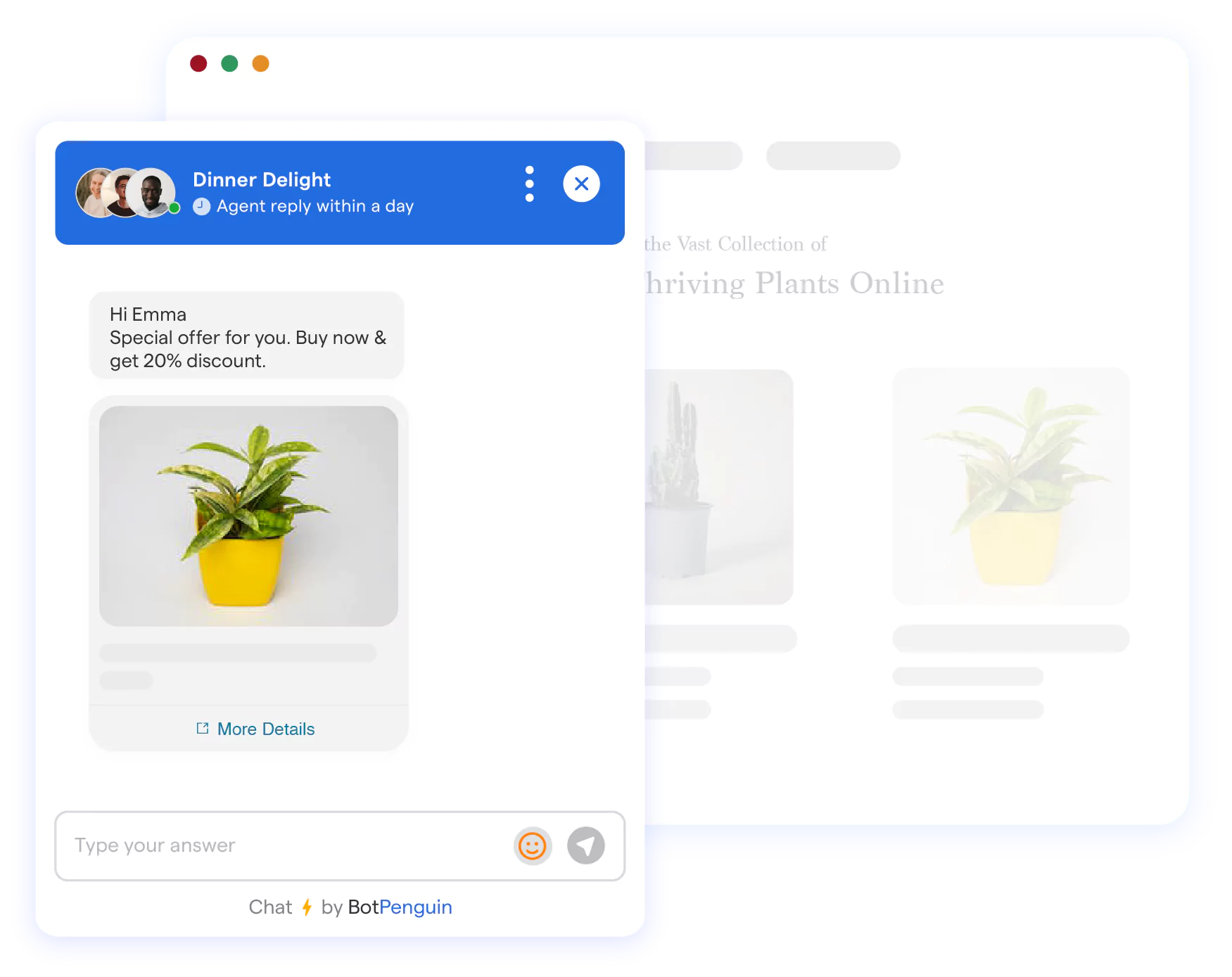
Custom AI solutions for businesses significantly enhance customer experience. Imagine an e-commerce platform that uses AI to provide personalized shopping experiences.
The AI system analyzes customer behavior and preferences to recommend products tailored to individual tastes. This level of personalization increases customer satisfaction and loyalty, as shoppers feel understood and valued by the business.
Competitive Advantage
Businesses that implement the best AI integrations for businesses gain a competitive edge. Take the example of a logistics company using AI for route optimization.
The AI model calculates the most efficient delivery routes, reducing fuel consumption and delivery times.
This efficiency not only cuts costs but also improves service quality, giving the company a significant advantage over competitors who still rely on traditional methods.
Improved Decision Making
With custom AI for business, decision-making becomes data-driven and more accurate. A financial services company, for instance, can use AI to analyze vast amounts of market data to identify investment opportunities.
The AI model processes information faster and more accurately than humans, providing insights that help the company make informed decisions quickly, reducing risks and increasing profitability.
Applications of Custom AI for Business in Various Industries
Custom AI for Business is transforming various industries by introducing innovative solutions that streamline operations and enhance efficiency.
Retail: Personalized Marketing, Inventory Management
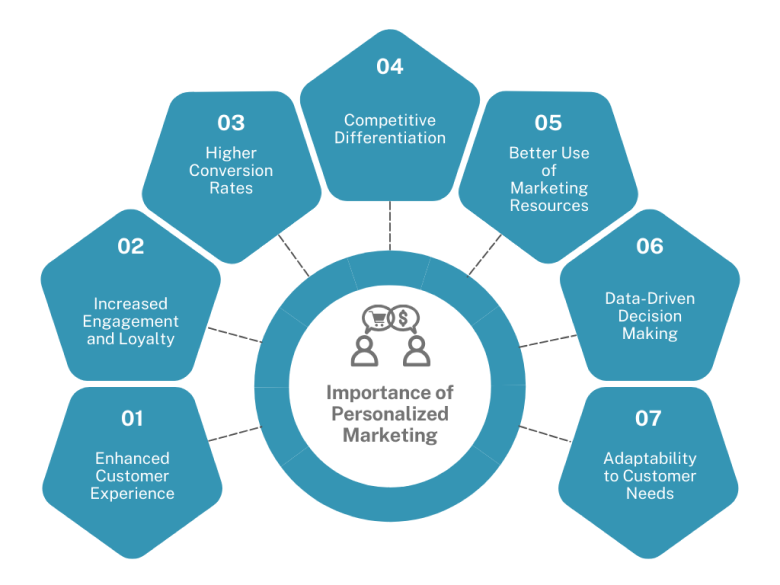
Custom AI solutions for businesses in retail are revolutionizing customer interactions and inventory processes.
Personalized Marketing: Retailers use AI to analyze customer data and predict preferences. Imagine a clothing store that sends personalized recommendations to shoppers based on their past purchases and browsing history.
This targeted marketing approach increases sales and customer loyalty by providing relevant suggestions.
Inventory Management: Custom AI for business monitor stock levels and predict future demand. Think of a grocery store that uses AI to ensure popular items are always in stock and reduce overstock of less popular products.
This results in efficient inventory turnover and reduced waste, optimizing the store's operations.
Healthcare: Predictive Diagnostics, Patient Management
Custom AI models for businesses in healthcare are enhancing diagnostic accuracy and patient care.
Predictive Diagnostics: Custom AI for business analyzes medical data to identify potential health issues before symptoms appear.
A hospital might use AI to screen patient records and flag those at risk of developing chronic conditions. Early detection allows for timely intervention, improving patient outcomes and reducing treatment costs.
Patient Management: Custom AI for business streamline administrative tasks, such as scheduling and follow-ups.
Consider a clinic that uses AI to manage appointments and send reminders to patients. This reduces no-shows and ensures patients receive timely care, enhancing overall efficiency.
Finance: Fraud Detection, Risk Assessment

Custom AI for Business in finance is crucial for ensuring security and making informed decisions.
Fraud Detection: Custom AI for business monitors transactions for unusual patterns that indicate fraud.
A bank might implement an AI system to flag suspicious activities, such as large withdrawals from a dormant account. This helps prevent financial losses and protects customers' assets.
Risk Assessment: Custom AI for business evaluates credit risk by analyzing financial data. Lenders use AI to assess the likelihood of loan repayment.
This allows for more accurate lending decisions, reducing defaults and increasing profitability.
Manufacturing: Predictive Maintenance, Quality Control
The best AI integrations for businesses in manufacturing improve equipment reliability and product quality.
Predictive Maintenance: AI predicts when machinery needs maintenance, preventing breakdowns. A factory might use AI to monitor equipment and schedule repairs before issues arise.
This minimizes downtime and extends the lifespan of machinery, saving costs and ensuring continuous production.
Quality Control: Custom AI for business inspects products for defects during manufacturing. Think of a car manufacturer using AI to detect flaws in parts before assembly.
This ensures that only high-quality components are used, reducing recalls and maintaining brand reputation.
Customer Service: Chatbots, Sentiment Analysis
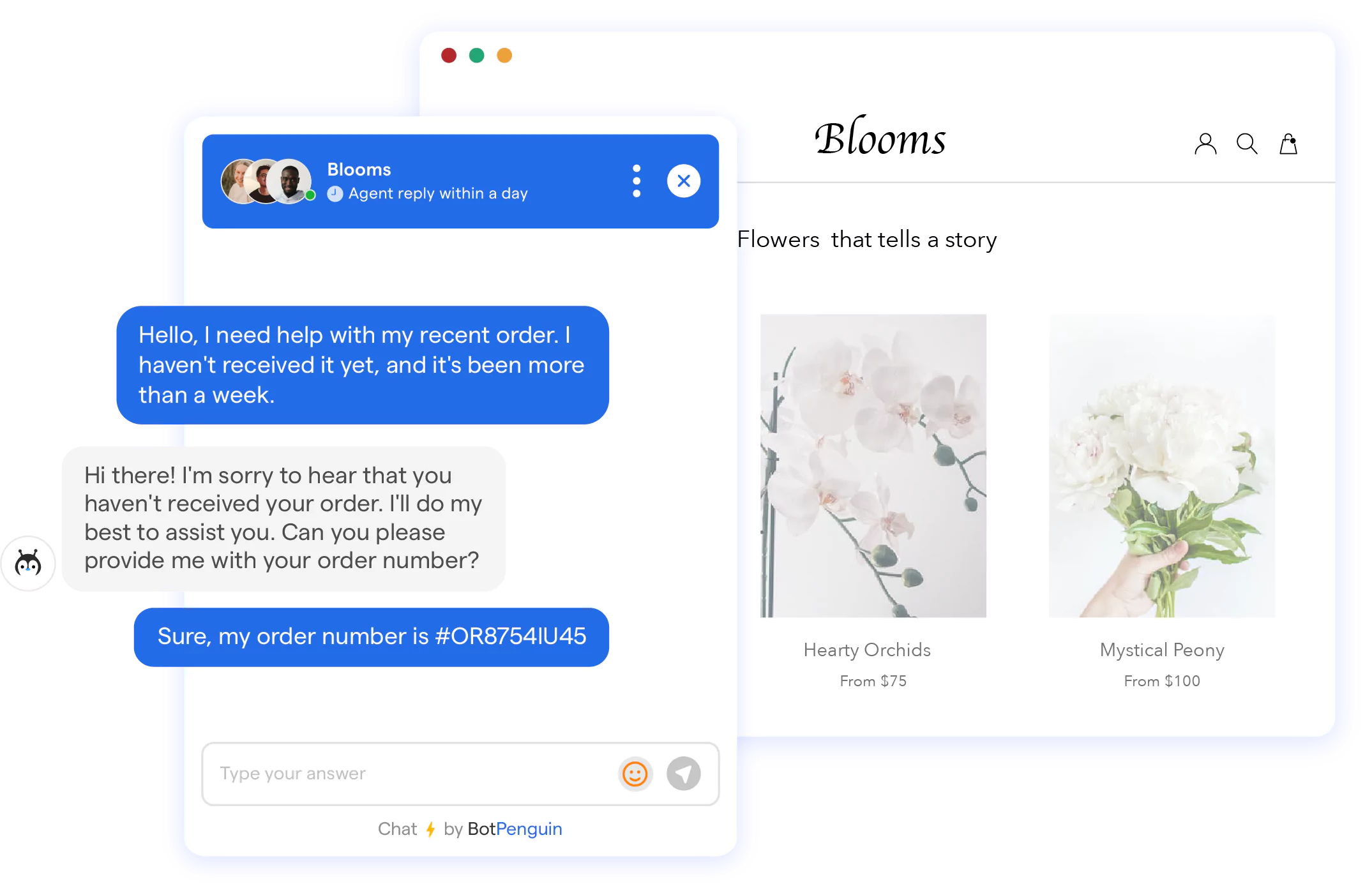
Custom AI solutions for businesses in customer service enhance interactions and gather valuable insights.
Chatbots: AI-powered chatbots handle routine customer inquiries efficiently. An e-commerce site might use chatbots to answer questions about order status or return policies.
This provides quick responses, improving customer satisfaction and freeing up human agents for complex issues.
Sentiment Analysis: Custom AI for business analyzes customer feedback to gauge sentiment. A telecom company might use AI to review customer reviews and identify areas for improvement.
Understanding customer sentiment helps the company address concerns promptly and improve its services.
Steps to Implement Custom AI in Your Business
Implementing custom AI for business can seem daunting, but breaking it down into manageable steps makes the process straightforward and achievable.
Step 1
Identify Business Needs and Goals
Start by identifying specific areas where custom AI solutions for businesses can have the most impact. Look at your business processes and determine where AI can help improve efficiency, reduce costs, or enhance customer experience.
Suppose customer support is a pain point; AI chatbots could be the solution. Setting clear goals will guide your AI strategy and ensure it aligns with your overall business objectives.
Step 2
Research AI Solutions

Once you have identified your needs, research the available custom AI models for businesses that can address them. Look into different AI technologies and their applications.
Compare various AI providers and their offerings to find the best fit for your requirements.
If you need AI for predictive maintenance in manufacturing, look for providers specializing in that area. Thorough research helps you understand your options and make informed decisions.
Step 3
Choose the Right Technology and Tools
Select the appropriate AI technologies and tools based on your research. Ensure the tools you choose integrate seamlessly with your existing systems.
Retail businesses looking to implement personalized marketing should choose AI platforms that specialize in data analysis and customer segmentation.
Selecting the best AI integrations for businesses is crucial for smooth implementation and optimal performance.
Step 4
Develop and Train AI Models
With the right tools in place, develop and train your custom AI models for businesses. This involves collecting and preparing data, designing the model architecture, and training the model using your data.
A financial firm might collect transaction data to train a fraud detection model. Training AI models requires expertise, so consider collaborating with AI specialists or consulting firms to ensure accuracy and efficiency.
Step 5
Test and Deploy the AI Solution
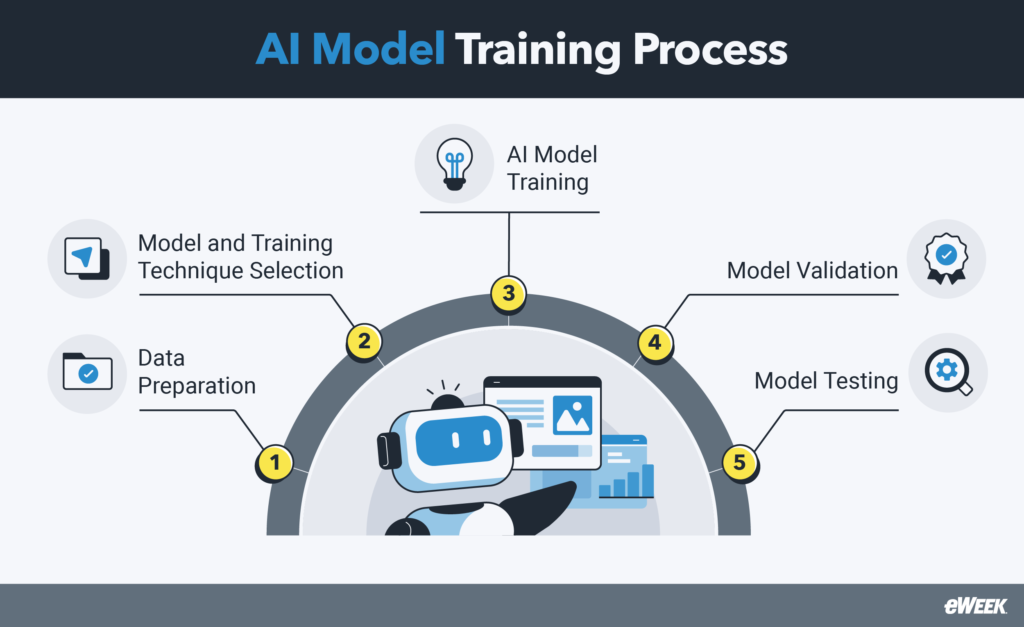
Before fully integrating custom AI for business into your business operations, test your AI models thoroughly. Conduct pilot tests to identify any issues and refine the models.
Implementing AI for customer service might involve testing the chatbot with a small group of users to gather feedback.
Once testing is complete and you are satisfied with the performance, deploy the AI solution across your organization. Proper testing and deployment minimize risks and ensure a smooth transition.
Step 6
Monitor and Optimize Performance
After deployment, continuously monitor the performance of your AI models. Use analytics tools to track their effectiveness and identify areas for improvement.
Healthcare providers using AI for patient management should regularly review the system's accuracy in scheduling and follow-up reminders.
Regular monitoring helps you catch issues early and optimize performance, ensuring your custom AI for business remains effective and delivers the desired outcomes.
Challenges and Considerations
Implementing custom AI for business can bring significant benefits, but it's important to be aware of the challenges and considerations involved.
Data Quality and Availability
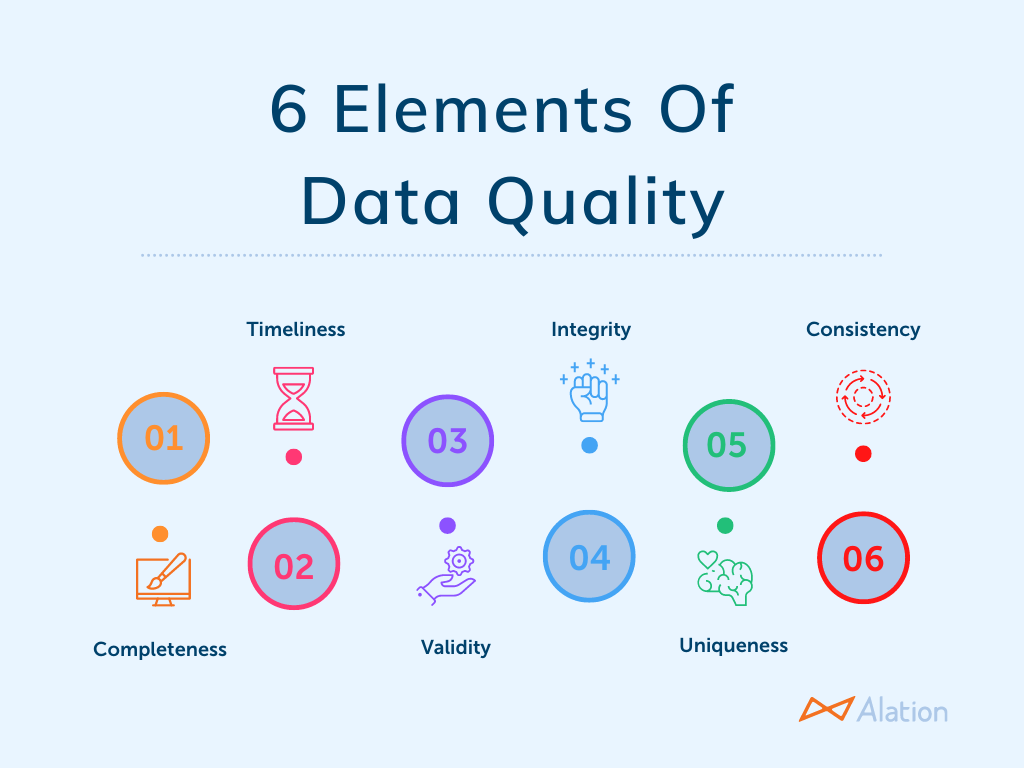
High-quality data is crucial for the success of custom AI solutions for businesses. Poor data quality can lead to inaccurate predictions and ineffective AI models.
Data Quality: Businesses must ensure that the data used to train AI models is accurate, complete, and relevant. In a retail setting, inaccurate sales data can lead to poor inventory predictions, causing stockouts or overstocking.
Data Availability: Sufficient data must be available to train robust AI models. A healthcare provider may struggle if patient records are incomplete or scattered across different systems. Consolidating and cleaning data is essential to create effective AI models.
Integration with Existing Systems
Integrating custom AI models for businesses with existing systems can be complex and challenging.
Compatibility: Ensuring that AI tools are compatible with current software and hardware is vital. A financial institution implementing AI for fraud detection needs to integrate AI with their existing transaction processing systems without causing disruptions.
Data Flow: Smooth data flow between AI systems and existing business processes is crucial. Manufacturing companies using AI for predictive maintenance must ensure real-time data from sensors is accurately fed into the AI system for timely predictions.
Cost and Resource Investment
Implementing custom AI for business requires significant investment in terms of cost and resources.
Initial Costs: Developing and deploying AI solutions can be expensive. Small businesses might find it challenging to allocate funds for AI projects without compromising other critical areas.
Ongoing Maintenance: AI systems require continuous monitoring and updates. A logistics company using Custom AI for business for route optimization must regularly update the system with new traffic data and maintain the hardware and software infrastructure.
Ethical and Legal Considerations
Using custom AI solutions for businesses comes with ethical and legal responsibilities that must be carefully managed.
Bias and Fairness: AI models can inadvertently perpetuate biases present in the training data. An HR department using AI for recruitment must ensure that the AI system does not discriminate against any group, maintaining fairness and inclusivity.
Privacy and Compliance: Businesses must comply with data protection regulations when using AI. A healthcare provider using AI for patient diagnostics needs to handle sensitive patient data responsibly, adhering to privacy laws like HIPAA.
Suggested Reading:
Custom AI Solutions vs Off-the-Shelf for Businesses
Future Trends in Custom AI for Business
Custom AI for business is rapidly evolving, with new advancements and applications continuously emerging. Understanding these future trends can help businesses stay ahead and leverage AI to its fullest potential.
AI Advancements and Emerging Technologies
The field of custom AI for business is constantly advancing, with new technologies enhancing the capabilities of custom AI models for businesses.
AI Advancements: Innovations like deep learning, reinforcement learning, and natural language processing are making AI more powerful and versatile.
A retail business could use advanced AI to analyze customer sentiments from social media in real-time, providing deeper insights into consumer behavior.
Emerging Technologies: Integrating AI with technologies such as blockchain, Internet of Things (IoT), and quantum computing is creating new opportunities.
A logistics company might combine AI with IoT to optimize supply chain management, using real-time data from connected devices to improve efficiency and reduce costs.
Potential New Applications in Business
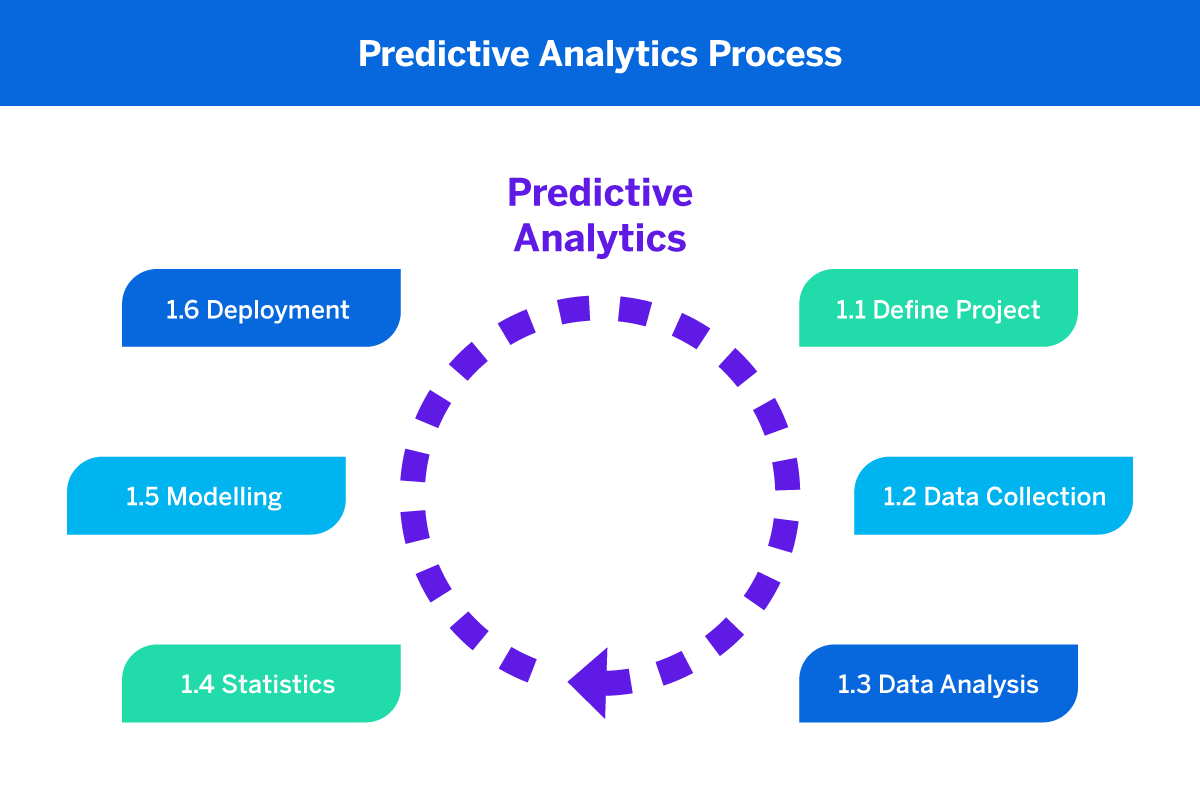
As AI technology progresses, its applications in business are expanding, offering new ways to drive growth and innovation.
Predictive Analytics: Businesses are increasingly using AI for predictive analytics to forecast trends and make data-driven decisions.
A financial services firm could use AI to predict market movements, helping clients make informed investment choices.
Automated Content Creation: AI is being used to generate content, from marketing materials to news articles.
A media company might employ AI to produce personalized news feeds for its readers, increasing engagement and user satisfaction.
Enhanced Cybersecurity: AI can bolster cybersecurity measures by identifying and mitigating threats more effectively.
A tech company could use AI to detect unusual network activity, preventing potential cyber attacks and ensuring data security.
Preparing for the Future of AI
To stay competitive, businesses must prepare for the future of AI by adopting strategies that embrace these advancements and applications.
Invest in AI Training: Companies should invest in training their workforce on AI technologies. An enterprise can offer courses and workshops to help employees understand and work with AI, ensuring they are ready to leverage new tools and solutions.
Adopt Agile Practices: Embracing agile methodologies allows businesses to quickly adapt to AI advancements.
A startup might use agile practices to iteratively develop and deploy AI solutions, staying flexible and responsive to changes in technology and market demands.
Collaborate with AI Experts: Partnering with AI specialists can help businesses implement the best AI integrations for businesses.
Collaborating with AI experts ensures that the technology is used effectively and tailored to the company’s specific needs.
Conclusion
As we've explored throughout this guide, custom AI solutions for businesses are revolutionizing the way companies operate and compete.
By leveraging custom AI for business, organizations can unlock unprecedented levels of efficiency, innovation, and customer satisfaction. The best AI integrations for businesses go beyond off-the-shelf solutions, tailoring artificial intelligence to specific industry needs and challenges.
Custom AI for business is not just a luxury for large corporations; it's becoming an essential tool for companies of all sizes to stay competitive.
Platforms like BotPenguin are making it easier than ever for businesses to implement custom AI solutions, from chatbots to predictive analytics tools. As AI technology continues to evolve, the potential for custom AI models for businesses will only grow, offering even more sophisticated and impactful solutions.
By embracing custom AI solutions for businesses, companies can position themselves at the forefront of their industries, driving growth and innovation.
The journey into custom AI for business may seem daunting, but with the right partners and a clear strategy, the benefits are well worth the investment.
Frequently Asked Questions (FAQs)
How does custom AI for business improve business efficiency?
Custom AI for business automates routine tasks, analyzes data quickly, and optimizes processes, allowing employees to focus on higher-value activities and improving overall operational efficiency.
What are common applications of custom AI in business?
Common applications of custom AI for business include personalized marketing, predictive maintenance, fraud detection, inventory management, and customer service enhancements such as chatbots and sentiment analysis.
What are the benefits of using custom AI solutions?
Benefits of custom AI for business include increased efficiency, cost savings, improved decision-making, enhanced customer experience, and gaining a competitive edge in the market.
What challenges might businesses face when implementing custom AI for business?
Challenges include ensuring data quality and availability, integrating AI with existing systems, managing costs and resources, and addressing ethical and legal considerations.
How can businesses prepare for the future of AI?
Businesses can prepare by investing in AI training, adopting agile practices, staying informed about AI advancements, and collaborating with AI experts to implement effective solutions.



